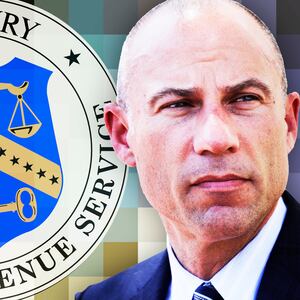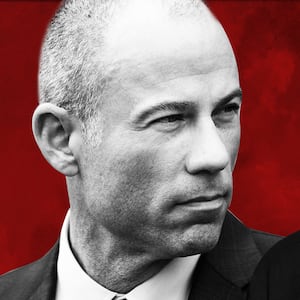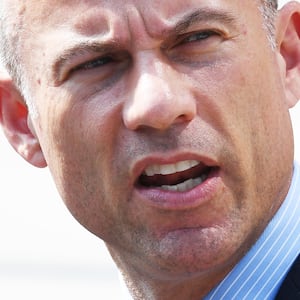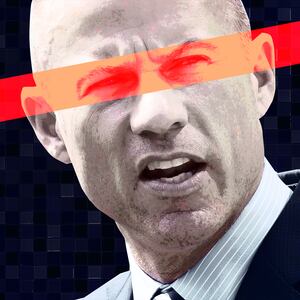Michael Avenatti and his former law firm are accused of secreting millions of dollars from a bankruptcy court by stashing them in undisclosed accounts—and of using client-trust accounts to, among other things, funnel thousands to his ex-girlfriend Mareli Miniutti, and pay down debts of his doomed former coffee company.
According to new court filings, as creditors pursued Avenatti in 2018, the California litigator made famous for representing Stormy Daniels was apparently footing the bill at a Cabo restaurant and elite Parisian bar and swingers’ club and doling out more than $230,000 to a German auto-racing team via Avenatti & Associates’ coffers. He also allegedly used two separate client-trust accounts to pay thousands to Miniutti over the summer. (Asked about the foreign purchases, Avenatti said, “I have no recollection of making the two charges you identify—other people had access to make charges to this account.”)
The allegations are the latest bombshell to rock Avenatti’s private world, as his seemingly troubled finances are turning increasingly public through his pending divorce proceedings and a legal battle waged by his former colleague, Jason Frank, who won a $10-million judgment after Avenatti failed to pay a settlement over unpaid compensation.
Last Wednesday, Avenatti and Frank reached an agreement to place Avenatti’s former Newport Beach firm, Eagan Avenatti, into receivership. The receiver would take over the firm’s assets, including accounts, case files, offices, and computer systems.
The day before, Frank filed a motion asking a federal judge to appoint a receiver to prevent what he called “brazen acts of bankruptcy fraud” by Avenatti and his onetime firm.
“EA and Avenatti have been concealing millions of dollars of EA’s assets in undisclosed bank accounts and client trust accounts and have been improperly and fraudulently transferring millions of dollars to Avenatti and his various corporate entities, as well as to third parties,” Frank’s legal team alleged in court papers.
“The appointment of a receiver and restraining order is necessary and appropriate to ensure the judgment is honored and to thwart further efforts by EA and Avenatti to conceal and dissipate EA’s assets,” the filing continued.
Still, as part of the deal reached with Avenatti on Wednesday, Frank’s law firm agreed to withdraw his motion and related pleadings and exhibits, and consent to a judgment debtor’s examination scheduled for March.
On Thursday, Avenatti released a statement to The Daily Beast in response to Frank’s allegations, calling them “nonsense” and adding that’s why they were withdrawn.
“It is based on an incomplete set of documents, as well as documents that appear to be doctored. He has also violated the attorney-client privilege and right to privacy of various clients, for which there are severe consequences,” Avenatti said. “There has never been any misdeeds or fraud—any claim to the contrary is politically motivated, completely bogus and driven by Jason’s own personal demons and vendetta.”
“At all times, I was permitted to take fees from the cases in which I served as counsel and as the Bankruptcy Court long ago ordered, not all of the fees from all of the cases were even due Eagan Avenatti, LLP. Nothing was hidden and there was nothing improper. Every dollar has been properly accounted for and reported as required and as previously set forth in numerous accountings. This is much to do about nothing.”
Asked why he agreed to the receivership, Avenatti said, “Because we have not operated under that firm primarily for a long time—well over a year. While we may still use the email address, we do very little work on EA cases nor does EA have much in the way of assets.
“This is a big nothingburger,” he continued. “EA is an old firm with very little assets, so who cares?”
Scott Sims, an attorney for Frank, told The Daily Beast, “The fact EA and Avenatti did not fight the motion speaks for itself.”
“The motion asked the court to appoint a receiver to take over Eagan Avenatti and to issue a restraining order to prevent Avenatti from hiding or spending EA’s assets, among other relief,” Sims said. “Avenatti capitulated and agreed to everything we asked for in the motion. Since he agreed to what we wanted, the motion is now moot so we agreed to withdraw it.”
Frank’s court filing included bank statements that allegedly showed a series of wire transfers to Mareli Miniutti— Avenatti’s former girlfriend, who in November accused him of domestic violence—from client-trust accounts and one operating account. (Avenatti denied her domestic violence claims and Los Angeles prosecutors, and later the L.A City Attorney Mike Feuer, declined to pursue charges against Avenatti.)
In her petition for a restraining order, which was temporarily granted and upheld by a judge in January, Miniutti claimed Avenatti attacked her during an argument about money and called her an “ungrateful, fucking bitch” before hitting her with pillows.
In a letter to authorities, reported by Vanity Fair, an attorney for Avenatti said a security guard witnessed Miniutti complaining that Avenatti was no longer offering to help her financially. “We are concerned about potential animosity because Mr. Avenatti had promised [her] assistance in paying off a credit card debt she has accumulated, but obviously he has not done so in light of the emergency protective order and current events,” the attorney wrote.
Documents filed in Frank’s case appear to show multiple payments to Miniutti totaling $33,000 from March to October 2018. One Eagan Avenatti attorney-client trust account paid Miniutti $8,000 on March 23, $4,000 on April 12, and $1,500 on Oct. 16, bank records appear to show.
A client-trust account, opened under “Michael Avenatti, Esq.” paid Miniutti a total of $14,500 across five transactions in June and July. An operating account, also opened under Avenatti’s name, paid Miniutti $5,000 on May 24.
Miniutti could not be reached for comment. Her attorney, Michael Bachner, told The Daily Beast, “To extent that Mareli received money from Mr. Avenatti, her assumption was that she was receiving it from him in his individual capacity.”
Asked about the payments, Avenatti said “there was nothing improper about it.” He added that Miniutti “was a client of the firm” in connection with a litigation dispute and a divorce.
As The Daily Beast previously reported, Frank subpoenaed Eagan Avenatti’s bank records and allegedly discovered the firm transferred millions to Avenatti’s professional corporation, Avenatti & Associates, and to Global Baristas, the lawyer’s former failed coffee company.
Frank’s latest court documents suggest that Avenatti opened six secret bank accounts—including five client-trust accounts—to shelter millions in profits from creditors and the court overseeing his old firm’s bankruptcy.
The bank statements also appear to show that Avenatti wired thousands of dollars from Fight PAC, a political action committee he launched last year as he considered running for president in 2020, into an undisclosed client-trust account.
According to the court documents, in October 2018, Avenatti wired a total of $31,776, in three separate transactions, from “FIGHT PAC” into the California Bank & Trust attorney-client trust account for Eagan Avenatti. Campaign finance records show the PAC raked in $115,072 from July through December. The Fight PAC’s disbursements indicate Avenatti reimbursed himself for “food/beverage/lodging/transportation” on Oct. 10, Oct. 16, and Oct. 24.
“With Trump and his cronies on the ropes, we must remain vigilant and continue to speak truth to power. Join the Fight Pac, help lead the resistance and let your voice be heard. #Basta,” Avenatti tweeted in December.
Frank also accused Avenatti of deceiving U.S. Trustee officials about this supposed collection of undisclosed accounts during a meeting of creditors.
“Avenatti never disclosed that he opened these... accounts during the bankruptcy, nor did he disclose the existence of these accounts. In fact, under questioning by the U.S. Trustee’s Office… Avenatti denied, under oath, that he currently had any client trust accounts in his name, despite opening these accounts a month earlier,” court papers allege.
According to the filing, Eagan Avenatti went into bankruptcy in March 2017 and was required to close its bank accounts and open new “debtor in possession” bank accounts. The firm opened three new debtor accounts two months later.
But on May 11, 2017, Avenatti allegedly opened two new accounts at City National Bank under the name “Michael Avenatti, Esq.” One was an operating account, while the other was a “client-trust account,” court papers claim. (Client-trust accounts are governed by the state bar and used to hold client funds, including settlement checks.)
Frank claims Avenatti opened two more client-trust accounts at City National Bank (CNB), in September and December of 2017, but never disclosed them during the bankruptcy.
Avenatti told The Daily Beast that Frank’s claims are “complete and utter bullshit.”
“I disclosed what I was required to disclose at all times,” he said. “Jason seems to think I had to disclose information about every firm and account I had and every client, regardless if they were an EA client. This is flat-out wrong and the bankruptcy court rejected this argument on this point many times.”
The first alleged diversion of funds came in May 2017, from a million-dollar payout from the NFL over a Super Bowl XLV ticket dispute lawsuit.
Eagan Avenatti’s co-counsel received $188,281, while the balance of $1.36 million went to Avenatti’s old firm, according to the bank records. Emails obtained by Frank reveal that Avenatti directed his co-counsel to split up the payments, with $408,723 going into Eagan Avenatti’s CBT account and the remaining $952,994 deposited into an undisclosed client-trust account at CNB.
Eagan Avenatti disclosed the $408,723 in its monthly operating report for the bankruptcy court, but did not publish information of the latter payout, court papers allege.
Frank says that as soon as the NFL money was deposited into the secret CNB account, Avenatti wired it to Avenatti & Associates’ operating account. Avenatti then spent the settlement money on “personal expenses” including his $14,235-a-month luxury apartment and $4,000 monthly car payments on his Ferrari, Frank claims.
Bank statements attached to the court filings also showed a $11,000 payment to Traditional Jewelers, a $1,348 check for Koi fish, and transfers of $150,000 to Global Baristas and $232,875 to HTP Motorsport GmBh, which is likely for Avenatti’s race-car-driving hobby.
Avenatti claims he was “permitted to operate in an individual capacity,” through Avenatti & Associates and to share fees with those entities.
“All of the money due the clients was distributed and apportioned to the clients per the settlement after the deduction of out-of-pocket costs and expenses. This was specifically overseen by the federal court. Jason's ‘accounting’ does not include the over $1 million in out-of-pocket costs and expenses that I and Avenatti & Associates advanced while we tried the case, for which we were due reimbursement, nor all of the money that was long ago distributed to the clients,” Avenatti said in a statement.
Meanwhile, the records appear to show that Avenatti opened another undisclosed client-trust account at CNB in December 2017, apparently for a settlement for client Gregory Barela.
Last month, The Daily Beast exclusively revealed that Barela had filed an arbitration claim against Avenatti, claiming he pocketed Barela’s settlement money and then tried to lend him some of those funds with 10 percent interest.
Barela accused Avenatti of “operating his law firm in a Ponzi scheme like manner” and using client funds to “pay off debts” and “fund his lavish lifestyle,” all while claiming a third party never paid Barela’s settlement. Aventti called Barela’s claims “completely fabricated, bogus and fraudulent” and said “he has received 100 percent of what he is entitled to.”
While the amount in Barela’s filing was redacted, the bank records Frank subpoenaed reveal Avenatti’s firm received a $1.6-million wire from Brock USA LLC on Jan. 5, 2018. And that the day before, Avenatti deposited a $11,718 check from Judicial Arbiter Group, Inc. into one of the reportedly undisclosed CNB accounts. The memo line from the check was “Barela v. Brock.”
Avenatti then allegedly used this money to pay Global Baristas’ expenses, Frank's filings claim. Bank statements in the court filings show payments in January and February 2018 totaling $163,692 to Dillanos Coffee Roasters and Alki Bakery—companies which Global Baristas owed money, according to one Seattle Times report.
Eagan Avenatti never disclosed the Barela case in a schedule of assets to the bankruptcy court, Frank’s motion alleges. “On the contrary, as part of EA’s Monthly Operating Report for January 2018, Avenatti signed a statement under penalty of perjury stating that he, as EA’s principal, did not receive any compensation that month.”
Avenatti claims Barela “received all information and documents and monies that he has ever been entitled to and any claim to the contrary is false, bogus and nonsense.”
“We represented Barela on multiple matters and incurred huge out of pocket costs on those matters, some of which we have never even been reimbursed for,” Avenatti added. “We were permitted to keep fees and costs from the initial lump sum, with our entire fee being paid from that first lump sum as opposed to deducting it from subsequent yearly payments.”
Neil Wertlieb, an adjunct professor at UCLA School of Law, told The Daily Beast that attorneys open client-trust accounts in a special agreement with the state bar, and that these accounts accrue interest to fund state bar operations.
“It is a very specific type of account and an attorney has no business creating a client-trust account and putting funds into a client-trust account that don’t belong there,” said Wertlieb, who is the former chairman of the California State Bar’s Committee on Professional Responsibility and Conduct.
“The state bar prohibits attorneys from commingling their personal funds with funds that belong to clients,” Wertlieb added.
If an attorney is found to misuse client funds, they could face financial penalties, or suspension of their license or disbarment if the case is egregious enough, Wertlieb said. Taking client settlement money to pay personal expenses—as alleged by Barela—could lead to charges of conversion or similar crimes. “To say it’s a violation of the rules to pay personal expenses is an understatement,” he said.
“Regardless of how many accounts are maintained and how many clients are involved, it is critically important that an attorney maintain careful bookkeeping and accounting to show down to the penny … how much of that is held on behalf of each client,” Wertlieb said. “And that’s part of the problem with commingling. If the attorney puts his or her own money into a client-trust account, then it becomes unclear of who owns what.”
Still, after reviewing some of the exhibits in Frank’s case, Wertlieb said payments to Miniutti and to creditors “may be legitimate if they were from funds that were first legitimately deposited into the applicable client-trust account for the benefit of a client, and then withdrawn from the account once earned by Mr. Avenatti.”
“While from an accounting standpoint (for proper bookkeeping and tracing purposes), the funds should have been moved from the client trust account to Mr. Avenatti’s (or his firm’s) operating account, and then paid out wherever he directed, I am not aware of any ethical violation resulting from the payment to third parties as may be directed by Mr. Avenatti once such fees are earned,” Wertlieb continued.
But the funds must be “properly deposited into the client trust account in the first place,” and earned by Avenatti, Wertlieb said. And bypassing the operating account shouldn’t be done with the intended purpose of hiding funds from creditors.
Bruce A. Markell, a retired bankruptcy judge and professor of bankruptcy law and practice at Northwestern Pritzker School of Law, said the bankruptcy court has the power to determine who owns what regardless of how parties titled it.
These powers “extend to recharacterizing who, or what, comprises the debtor,” Markell said, adding, “If the bankruptcy court ultimately determines that Eagan Avenatti was the alter ego of others, it has the power to bring those others into the proceeding. And the best way to make that determination is to review the payments made, and the transactions among the participants, as the court has done.”
Asked generally about bankruptcy fraud, Markell said a federal statute permits bankruptcy judges to alert the U.S. Attorney if they have “reasonable grounds” for believing that crimes occurred in the court. But in Markell’s experience, such referrals aren’t often prosecuted.
Meanwhile, hiding assets in a bankruptcy case could be a felony punishable by up to five years in prison, statutes indicate. This would include a person who “knowingly and fraudulently conceals” from “creditors or the United States Trustee, any property belonging to the estate of a debtor.” Or someone who “knowingly and fraudulently makes a false declaration, certificate, verification, or statement under penalty of perjury,” the law states.
“If you move it up to Defcon 5, where somebody is running an intentional scam, there are criminal statutes that say, if you knowingly and fraudulently fail to disclose something, it’s a federal felony and a bankruptcy crime,” Markell said.
Bankruptcy proceedings are “so fraught with oversight and so fraught with problems that anyone who doesn’t disclose every single bit about it is bound to be a little bit suspicious,” Markell continued. “It’s not like you can play cute with this. People lose their license to practice law over these things. Every time you go to a continuing legal education [course], the mantra people chant is: disclose, disclose, disclose.”










